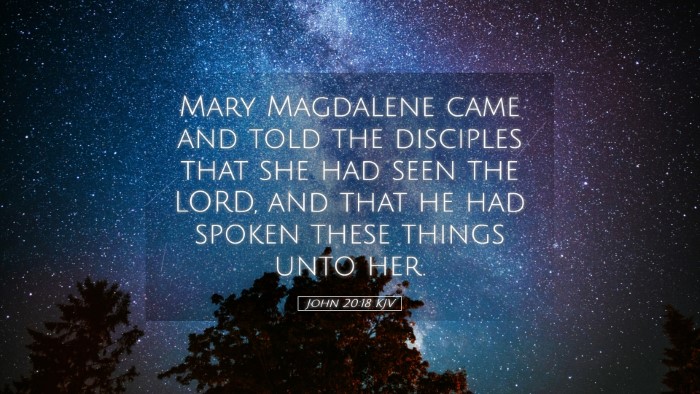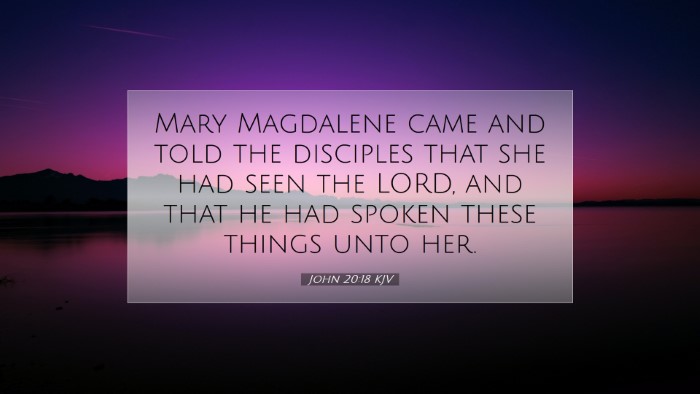Commentary on John 20:18
Verse Reference: John 20:18 - "Mary Magdalene came and told the disciples that she had seen the Lord, and that He had spoken these things unto her."
Introduction
This pivotal moment in the Gospel of John marks the resurrection of Jesus Christ as witnessed by Mary Magdalene. It encapsulates not only the triumph of life over death but also the profound role of women in the early church and the foundational nature of personal testimony.
Contextual Analysis
In the context of the Gospel, John 20 narrates the events following the resurrection. Mary Magdalene, having visited the tomb early in the morning, discovers it empty. Encountering the risen Christ, she is commissioned to share the good news with the disciples. This passage serves as a theological linchpin concerning the resurrection and the apostolic mission.
Historical Background
The Gospel of John is distinct in its portrayal of events surrounding Jesus' resurrection. Unlike the Synoptic Gospels, John's account provides unique insights, emphasizing relational encounters and theological implications of Christ's victory over death.
Mary Magdalene's Encounter
Mary's encounter with Jesus is profound. She is the first to see the risen Lord, which signifies her devotion and the transformation brought about through her faith. Her testimony emphasizes the role of women as pivotal communicators of the resurrection message.
Commentary Insights
- Matthew Henry: Henry emphasizes Mary's devotion and the significance of her obedience. He notes that her sorrow turned into joy at the realization of Christ's resurrection, urging believers to recognize the power of transformative faith.
- Albert Barnes: Barnes reflects on the implications of Mary's report to the disciples. He argues that her announcement is foundational for Christian belief, showcasing the essential nature of personal witness in spreading the gospel message.
- Adam Clarke: Clarke highlights the emotional journey of Mary, emphasizing the contrast between her despair and the joyous revelation of the risen Christ. He observes that her encounter underscores the intimate nature of the relationship believers have with the Lord.
Theological Significance
Theologically, John 20:18 encapsulates key tenets of Christian faith:
- Resurrection: This verse asserts the reality of the resurrection, a cornerstone of Christian doctrine. It reminds believers that Jesus overcame death, affirming the hope of eternal life.
- Commissioning: Mary's role as the first evangelist signals the inclusive nature of God's mission. This challenges traditional societal roles, emphasizing that all believers are called to share their faith.
- Personal Transformation: The profound personal transformation Mary experiences serves as an invitation for all believers to encounter Christ personally, leading to a vibrant faith and public proclamation.
Application for Pastors and Theologians
For pastors and theologians, John 20:18 offers a rich tapestry of themes to explore in sermons and teachings:
- Empowerment of Women: Recognizing the vital contributions of women in biblical narratives encourages contemporary discussions on gender roles within the church.
- Importance of Testimony: Believers are called to share their experiences of Christ, reinforcing personal testimonies as a crucial element of faith-sharing.
- Hope and Restoration: In a world filled with despair, this passage serves as a reminder of the hope found in Christ's resurrection, encouraging believers to embrace this message and share it fervently.
Conclusion
John 20:18 is not merely a historical account; it serves as a theological and practical framework for understanding the implications of the resurrection. As Mary Magdalene steps into the role of the first messenger of the risen Christ, her experience invites all believers to recognize their part in the ongoing narrative of God's redemptive work.


